
|
Pink Floyd: The Wall (1982,
UK)
In Alan Parker's and MGM's cultish, downbeat re-imagining
of the 1979 Pink Floyd album "The Wall", the British rock
group's 11th studio album - the rock opera was an adult-oriented
musical and dramatic masterpiece (a surrealistic "free form
video" with some animation), providing a remarkable
descent into madness and insanity through
a series of rambling music video segments, with both visual and auditory
representations. The Wall in this fantasy film was a symbol of the
isolation, pain, and disconnectedness felt by the lead character
named "Pink" - a fictional burnt-out rock star who became
a recluse as he faced traumatic psychological decline. It was a difficult
film to watch and follow, due to both its depressing subject matter
and the cryptic way that the lyrics and images depicted the story.
Problems developed for "Pink" beginning as
an infant when his father was killed in WWII. Without a father and
male role model, his overprotective mother unhealthily shielded and
suffocatingly smothered him. He also suffered from an oppressive,
subjugating school system and an abusive teacher, and lack of connectivity
with others, including his wife. Later, his notoriety as a rock star
brought him fame and popularity, but while on tour, he caught her
cheating on him and having an affair. From then on, he felt he had
no alternative but to build a figurative wall around himself, to
hide, to distance himself, to isolate himself, and to suicidally
attempt to save himself. Every instance of pain and hurt added another
"brick to the wall." He also began to imagine himself as
a power-hungry demagogue and the leader of a neo-fascist rally. After
realizing what had happened to him, he began a self-trial period,
with its final judgment spurring him on to tear down his isolating
wall.
There were 15 minutes of memorable animations that
appeared periodically during the film by cartoonist Gerald Scarfe
(who had created the album art for Pink Floyd). One of Scarfe's most
unique animated segments, known as "Dueling Rosebuds," was a symbolic,
sexually-explicit, botanical Freudian animation - a truly adult animated
work in terms of maturity (sexually and politically).
Bassist and singer Roger Waters, one
of Pink Floyd's own musicians, composed the score and provided the
screenplay. Lead singer Bob Geldorf, who fronted the Irish New Wave
rock band The Boomtown Rats, starred in his film debut as the title
character 'Pink'.
The depressing cult favorite had a budget of $10-12
million and grossed $22.2 million dollars.
- the film opened on a long, grayish hotel corridor,
where a uniformed maid was cleaning and vacuuming the rooms;
during the opening title credits (red letters on a black background),
Vera Lynn sang about a fatherless boy: "The
Little Boy That Santa Forgot," who was sad when he found that "Santa
hadn't come" (the small boy was pictured on a deserted rugby
field at sunset)
- in the opening sequence ("When the Tigers Broke
Free, Part 1"), a soldier named J.A. Pinkerton (James Laurenson)
(later identified as Pink's father) was on the Anzio beachhead
in 1944 during a WWII battle, with a platoon of Royal Fusiliers;
he was cleaning his revolver in the dim light of a hurricane lamp
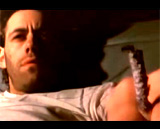
|
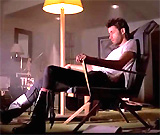
|
|
Pink in an LA Hotel Room
|
- burned-out and depressed rock singer Pink
(Bob Geldorf) was introduced seated in an armchair in a Los Angeles
hotel room, staring motionless and crazed;
his cigarette had burned down to his fingertips; the Spanish Maid
(Marie Passarelli) in the hallway attempted to open his door with
one of her pass-keys; the door opened a few inches, but was chained;
immediately, the door was transformed into a wooden exit door held
with a thick steel chain that was broken open by crowds of young
people (in a sports arena) surging through; as the frantic teens
rushed forward in a stampede and some were trampled, they were
cross-cut with a scene of uniformed troops advancing and emerging
from foxholes and falling on the WWII battlefield; outside the
arena, the teens were violently arrested and hauled away by police
- the scene transitioned to a foreshadowing scene
(seen in greater detail later) - in an outdoor plaza, a skin-head
(actually Pink) was preaching to the young teens listening below,
accompanied by a verse of the song: "In
the Flesh"; the doctrines of an eyebrowless, racist, fascist Hitler-like leader
of a Nuremberg-like rally were symbolized by a round insignia of
crossed arms and fists
- WWII Stuka dive-bomber planes flew over an Anzio
beachhead below; one of the blast casualties was Pink's father,
a 2nd lieutenant platoon commander as he cranked a field telephone;
a view of his bloody hand letting go of the phone signaled his death
- the death of Pink's father left young Pink as a
crying newborn in a carriage, to be raised by his paranoid, God-fearing,
overweight, and neglectful working-class mother (Christine Hargreaves),
suffering from her own post-partum depression, widowhood and grief;
in the ruinous aftermath of Anzio, corpses were collected by medics
to the tune of "The Thin Ice" - telling about life's
unpredictable 'cracks' and walls: ("Don't be surprised when a crack in the ice
Appears under your feet...")
- a tracking shot entered Pink's messy bedroom in
his lavish hotel suite (with the TV playing the Tom & Jerry
cartoon short "Puttin' on the Dog" (1944)), where
he was seen floating in his balcony's private swimming pool with
a bland and expressionless look on his face; but then the pool
water turned bloody red, as he reimagined his father's nightmarish
death
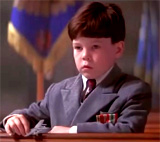
Young Fatherless Pink (Kevin McKeon) - 4 Year-Old
|
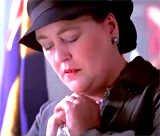
Pink's Devout, Overweight Working-Class Mother
(Christine Hargreaves)
|
- the lyrics of the song: "Another Brick in the
Wall, Part 1," described the devastating effect of the death
of Pink's father on the young boy aged 4 in the early 1950s, left
with only family album snapshots of his father: ("Daddy's
flown across the ocean Leaving just a memory A snapshot in the
family album Daddy what else did you leave for me? Daddy, what
d'ya leave behind for me?!? All in all it was just a brick in the
wall. All in all it was all just bricks in the wall"); the
young British boy had a deep longing for a father figure like
other boys had on a playground
- now at 10 years
of age, known as "Little Pink" (David Bingham),
one day in his mother's bedroom dresser drawer, he discovered his
father's military uniform, keepsakes, his gun, a box of bullets,
and a military scroll from "His Majesty" commemorating
his father's service: ("When the Tigers Broke Free, Part 2");
as he looked at the relics of his father's past, Little Pink put
on his father's military hat in front of a 3-panel mirror: ("...no-one
survived from The Royal Fusiliers Company C. They where all left
behind most of them dead the rest of them dying. And that's how the
High Command took my Daddy from me!")
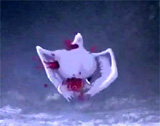
|
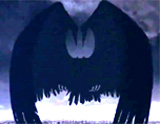
|

|
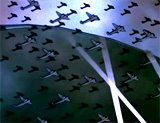
|
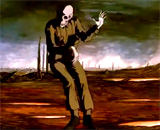
|
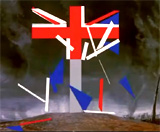
|
|
"Goodbye Blue Sky" - Animation - The
Bombing of the UK During WWII
|
- in the animated and nightmarish
"Goodbye Blue Sky," ("Did you see the frightened ones?
Did you hear the falling bombs?..."), a white dove was shot
down, and morphed into a dark monstrous Germanic bird of prey; it
symbolized a fighter plane bomber over London representative of "The
Blitz" and the bombers that killed Pink's father from once clear blue skies
during the bloody European war; the battles were fought by Britain
to defend its survival; blood drained off from the many graveyard
crosses
- later with his boyhood pals, Pink took one of
his father's gun bullets and placed it on steel train tracks
inside a tunnel near an embankment, and watched it flattened and
set off by an oncoming train; he also observed the scary, non-descript,
masked young passengers in the windows possessing claw-like fingers
- the song "The Happiest Days of Our Lives" explained how instructors at
Little Pink's school enjoyed exposing the weaknesses of the students:
("When we grew up and went to school There were certain teachers
who would Hurt the children in any way they could..."); Little
Pink's Teacher (Alex McAvoy) reprimanded him for writing poems
in a black book, and embarrassed him by reading one of them aloud:
"Money gets back. I'm all right, Jack. Keep your hands off my stack.
New car, caviar, four-star day dream, think I'll buy me a football
team" (it was part of verse 2 of the song "Money")
- then, the Teacher criticized it: "Absolute
rubbish, laddie"; education in the classroom consisted of
repeating the Teacher's lessons verbatim; the song went
on to explain that the reason for the Teacher's verbal abuse (and
frequent whipping of his students) was due to his strained marriage;
his domineering and overbearing wife at home was verbally
abusive towards him at the dinner table and insisted on his obedience
to her: "When they got home at night, their fat and Psychopathic wives would
thrash them Within inches of their lives," and the Teacher
transferred her abusiveness to students by paddling them
|
"Another Brick in the Wall, Part 2"
|
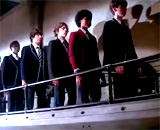
|
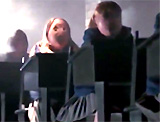
|
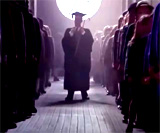
|

|
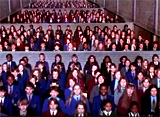
|

|
- in the ugly traumatic segment "Another Brick
in the Wall, Part 2," the memorable lyrics chastised Pink's
oppressive school systems that caused trauma to the young schoolchildren,
who were forced to strictly obey and never deviate, squashing their
creativity and leaving them forever psychologically scarred ("another
brick in the wall"):
- "We don't need no education We don't need
no thought control No dark sarcasm in the classroom Teachers
leave them kids alone Hey! Teachers! Leave them kids alone!
All in all it's just another brick in the wall"
- Pink imagined how his educational institution -
functioning as a rigid assembly line - turned marching, plodding,
and shuffling schoolchildren into faceless, conforming zombies
seated at desks before they were channeled and led forward to enter
a directionless maze; the regimented students were ultimately directed
to fall into an approaching meat-grinder; the young children suddenly
rioted - they threw off their masks and rebelled against
their authoritarian education by overturning their wooden desks,
chopping them into pieces with fire axes, breaking down the bricks
in the wall around them, and creating a huge bonfire with the remnants
of their old school; their mean Teacher was dragged toward the flaming ruins
- later as an adult in his London home, Pink recalled
that his overprotective "Mother" had also traumatically
scarred him for life, by causing him to be insecure, fearful and
indecisive; he also remembered how his Mother had been a major
influence on his choice of a wife (Eleanor David) and had put tremendous
strains on his subsequent marriage, soon to end due to a lack of
communication between the couple
- during the song "Mother," Pink
spoke to his mother with a series of troubling questions: "Mother
do you think they'll drop the bomb? Mother do you think they'll
like this song? Mother do you think they'll try to break my balls?
Oooh aah, Mother should I build the wall?"; as
a young boy, his Mother attempted to comfort him by unwisely having
him snuggle with her in bed
- his Mother's surveillance and direction of every
aspect of his life actually intensified his problems and created
more "bricks" in his wall, including his stunted emotional
maturity ("You'll always be baby to me"), lack of connectivity
to others, the disintegration of his health and his continuing
worries about his marriage partner choice:
- "Mother's gonna
make all your nightmares come true. Mother's gonna put all her
fears into you. Mother's gonna keep you right here under her
wing. She won't let you fly, but she might let you sing....Of
course Mama's gonna help build the wall....Mother do you
think she's good enough -- for me? Mother do you think she's
dangerous -- to me? Mother will she tear your little boy apart?
Oooh ma, Mother will she break my heart?"
- Pink curled up in a fetal position on his bed while
on tour with his band - his life was in emotional shambles; during
an attempted pay phone call to his wife and connect with her, Pink
realized that she was cheating on him when a man answered the phone
- she was naked in bed with another lover
- in the animated
segment known as "Dueling Rosebuds," the motif
of misogynistic woman-as-destroyer/devourer
was presented; in the passionate "flowers" scene two
flowers, the rose shaped like a male organ and the lily like a
female organ -- morphed into a couple having intercourse and then
engaged in a bloody fight when the female flower revealed sharp
teeth and devoured the male, and then metamorphosed into a flying pterodactyl
- during the next rock song: ""What Shall
We Do Now," questions were posed about the materialistic products
of post-war industrialization (symbolized by a rapidly-expanding
brick wall with a pained human face) that had been created for
production and consumption by the masses, to safisfy everyone's
'Empty Spaces': "What shall we use to fill the Empty Spaces
where waves of hunger roar?..."; answers included:
"Shall we buy a new guitar? Shall we drive a more powerful
car?", ending with: "Fill the attic with cash? Bury treasure? Store
up leisure? But never relax at all with our backs to the wall?"
- Pink needed to satisfy his growing needs (and 'empty
spaces') during the song "Young Lust": ("Where
are all the good times? Who's gonna show this stranger around?
Ooooh, I need a dirty woman. Ooooh, I need a dirty girl");
he specifically wanted a "dirty woman," something his Mother had
vowed to protect him from
- a group of four teenaged groupies entered
an underground parking garage near an arena during star singer
Pink's rock concert; one of them performed sexual favors for a
Security Guard (Winston Rose) in a booth to gain entry, and the
groupies were given backstage passes by four Roadies and invited
into the back of their trailer-tractor, where the American blonde
groupie (Jenny Wright) danced around and stripped off her top
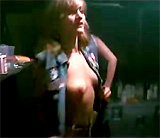
American Blonde Groupie (Jenny Wright) Stripping Down Backstage
in the Roadies' Tractor-Trailer During a Pink Rock Concert
|
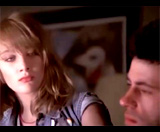
Pink - Jaded and Unresponsive with the Groupie in His Hotel Suite
|
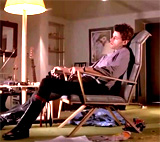
Pink - Seated Watching TV, Oblivious to the Groupie
|
- the blonde groupie was selected by Pink to be his
companion for the night, and taken back to his London
apartment; the jaded, socially-isolated, and unresponsive Pink
mindlessly grabbed the remote and watched TV (director
Michael Anderson's dramatic WWII film The Dam Busters (1955,
UK)), while the groupie marveled at the size of his place:
("This place is bigger than our whole apartment!"), and suggested
that they take a bath together; as the groupie kissed Pink's fingers,
she enticed him to have sex;
- the song "One of My Turns"
described Pink's mental state, and the onset of a maniacal episode:
("Day after day love turns grey, Like the skin of a dying man. Night
after night, we pretend it's all right But I have grown older and
You have grown colder and Nothin' is very much fun anymore. And
I can feel one of my turns coming on")
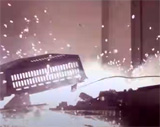
|
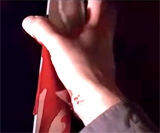
|
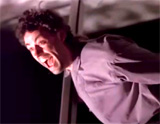
|
|
Pink's Rampage: His Smashed Television
Set, His Bloody Hand, His Wild Screaming
|
- suddenly, Pink went beserk and erupted into a rampaging
fury, smashing and destroying everything in the London apartment
- a lamp, a table, his camera, a mirror, his guitar, an entire
food cart, a wine bottle, a flower vase, a dresser, a picture,
his closet doors, the venetian blinds; then, he heaved his television
out of the balcony windows (it smashed onto the pavement below),
then gripped onto the window's broken glass with his right hand
with blood dripping down, as he madly screamed toward the city
below; the groupie was terrified, cowering in fear
- Pink imagined himself in the pool - in a crucifix
pose (with blood from his cut hand reddening the water), then fantasized
being in bed with his wife and hungrily embracing her nude as he
sang: "Don't Leave Me Now": ("Ooooh Babe. Don't leave me now. How
could you go? When you know how I need you..."); in the aftermath,
he sat alone in his living room amidst the wreckage, socially-isolated
from the world; blood dripped from his cut hand onto the floor,
enlarged to show the explosion of blood as it hit the floor
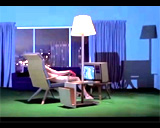
|
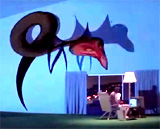
|
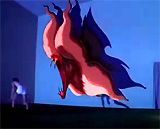
|
|
Pink Hallucinating Being Devoured by His Wife -
Symbolically the Lily Flower
|
- in the next segment during "Another Brick in
the Wall, Part 3," the lyrics described how Pink had
constructed a physical and metaphorical protective brick wall around
himself: ("I don't need no arms around me And I don't need no
drugs to calm me. I have seen the writing on the wall. Don't think
I need anything at all. No! Don't think I'll need anything at all.
All in all it was all just bricks in the wall"); but even in
his shell, he hallucinated the painful experience of breaking up
with his wife by imagining her silhouetted as the lily flower about
to devour him; a further montage of images previously shown were
played to reveal the utter disintegration of his life
- the film returned to the opening scene of Pink reclined
in a chair in his LA hotel room, ignoring the burning cigarette
between his fingers; he stared at a major brick wall surrounding
him as the song: "Goodbye Cruel World" played on the soundtrack:
(Lyrics: "Goodbye cruel world, I'm leaving you today. Goodbye...There's
nothing you can say To make me change my mind. Goodbye"); he outstretched
his arms with his fingers clawing at the impenetrable
barrier, realizing that there were no gaps; the next song: "Is
Anybody Out There?" repeated the line four times, signifying the
trap he had put himself in; there was no response to his repeated
question
- it was evident that he was going crazy, as he was
observed sorting out and placing his mostly worthless and broken
possessions (beer bottles, Coke cans, dollar bills, pink pills,
his musical instruments, pieces of broken LPs, candy wrappers,
Marlboro cigarette packs and cigarettes, a broken mirror, even
chicken bones, etc.) in various symmetrical patterns covering his
entire apartment floor; he shaved off all of his body hair in a bathtub (causing some areas
to bleed); Pink also resorted to more television viewing (of the war movie The
Dam Busters (1955, UK)
- the next melancholy and loner song, "Nobody Home"
(lyrics: "I've got a little black book with my poems in. Got a
bag with a toothbrush and a comb in. When I'm a good dog, they
sometimes throw me a bone in...I've got thirteen channels of s--t
on the T.V. to choose from") represented his emptiness, detachment
and isolation in life; he erratically punched and stabbed through
the TV channels with his remote, viewing a chaotic montage of shows
(e.g., a Tom & Jerry cartoon, Ronald Reagan's NJ Liberty State
Park Speech (Labor Day, 1980), barrel-jumping in the snow, The
Postman Always Rings Twice (1946), a Johnnie Walker 'Black
Label' commercial), but always returning to The Dam Busters (1955)
- he reverted to imagining himself as a young boy
walking by corpses on the dusty battlefield
(with hammers next to the stunted trees, twisted metal and barb-wire
fencing); he visited a military
infirmary with empty beds, and was shocked by the sight of a lunatic
patient (Pink himself) crouched in a corner; then, he walked through
a muddy trench and saw immense piles of corpses; Pink's younger
self and older iteration (in an arm-chair with a lamp watching
TV) faced each other
- during the next song "Vera," he
wandered through a foggy railway station where returning uniformed
soldiers were happily being greeted after a steam-engine pulled
in: (lyrics: "Does anybody here remember Vera Lynn? Remember how
she said that We would meet again Some sunny day?"); the young
boy envied those whose fighting fathers were returning home, where
he was unable to locate his own father in the crowds; then accompanied
by the patriotic lyrics of "Bring the Boys Back Home," those
on the platform (with the help of a marching band) sang the song
to young Pink, standing alone
- as the next song played ("Comfortably Numb"), Pink's
Manager (Bob Hoskins), along with the Hotel Manager (Michael Ensign)
and two Paramedics (Vincent Wong and Mark Newman) broke into Pink's
chained-shut and trashed LA hotel room and discovered the unconscious
Pink slumped in his armchair; the lyrics described the sequence:
"Hello? Is there anybody in there?...Come on, now, I hear you're
feeling down. Well I can ease your pain Get you on your feet again";
Pink was given oxygen and he became responsive; at the same time in
a brief sequence, the young Pink - to his mother's consternation,
found a sickly rat in a field, brought it home, and began to care
for it by creating a nest for it in a box; as the older Pink was
injected with drugs to revive him, Pink began to hallucinate and
flashback to when he was a young boy and was similarly
injected and treated for an asthmatic condition; shortly later,
young Pink found his pet rat dead, and disposed of it in a small
stream; once Pink was ready to go, he was dressed and escorted
away (although his body was still plagued with metaphoric "worms");
he was driven off in the back seat of a black Cadillac limousine
to a concert
- as he approached a concert arena in the limo, Pink
pulled off his decaying flesh, and morphed himself into his neo-Nazi
alter-ego - a black-uniformed Fascist dictator heading instead
toward a neo-Nazi political rally, with a jack-booted entourage
proceeding with him through a dark tunnel; his graphic insignia
was composed of two crossed hammers in a circle, plastered on black
banners hanging from the arena's ceiling and on other surfaces;
he kissed babies and shook hands with admirers before speaking
to an assembled hall of frenzied followers in London;
he gave the crowd a gesture of crossed arms - a stiff-armed salute
- before speaking behind a podium
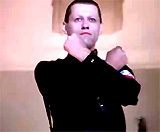
|
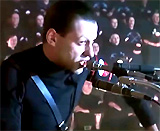
|
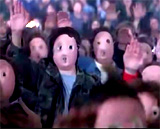
|
|
Signaling With Crossed Stiff Arms - A Symbol of
Violent Repression
|
- with the song "In the
Flesh," the fascist leader (with a stage
full of black-shirted enforcers, including a chorus, standing behind
him on stage) spoke to a very ecstatic and youthful skinhead audience,
and began by denouncing and singling out the riff-raff for persecution
-- unwanted ethnic minorities, including blacks, gays, and
Jews: ("queers," "Jews," "coons,"
and dopers too); he ordered for the victims to be rounded up:
"Get them up against the wall," as they were being
attacked; the faces of his acolytes turned into non-descript masks
- as guards with vicious dogs and black-booted skin-head
hoodlums continued to rampage through various parts of nighttime
London, and chase after and catch offensive individuals, Pink warned
in the song "Run Like Hell": (lyrics: "Run, Run, Run, Run, Run,
Run, Run, Run. You better run all day and run all night. Keep your
dirty feelings deep inside..."); in restaurants, on the streets,
in people's homes, and even in parked cars, black-uniformed skin-heads
continued their assault on the undesirables
- in the partially-animated musical segment "Waiting
for the Worms," the fascist movement extended into the southern
London suburbs at Brixton, where Pink held an outdoor rally; the
lyrics described the objective of the ominous black-shirts: "We're
going to be Waiting to cut out the deadwood. Waiting to weed out
the weaklings. Waiting to smash in their windows And kick in their
doors. Waiting for the final solution To strengthen the strain.
Waiting to follow the worms. Would you like to see Britannia Rule
again, my friend? All you need to do is follow - the worms";
the audience began to chant in unison: "Hammer, Hammer!";
cartoon hammers of repression rhythmically marched (or goose-stepped)
down bombed out streets and ruins
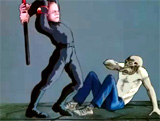
|
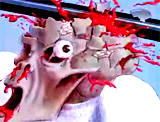
|
|
Violent Beatings in the Streets
|

|

|
|
Crossed Hammers Marching (Goose-Stepping) in Unison
in the Animated Segment: "Waiting For the Worms"
|
- suddenly, Pink stopped hallucinating or imagining
that he was a Fascist dictator - and screamed "Stop!";
he was seen cowering in a walled-in bathroom toilet stall within
the concert arena, quietly singing to himself, as a security guard
was washing up nearby; he sang: "I wanna go home Take off
this uniform And leave the show"; Pink asked himself: "Have
I been guilty all this time?";
Pink submitted himself for a trial; he was represented as a pink
rag-doll that was detained next to a cinderblock wall
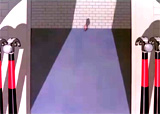
Pink (a Rag-Doll) Enclosed by a Wall, Putting Himself
on Trial
|
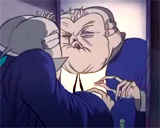
Prosecutor in "The Trial" Preening Before a Mirror
|
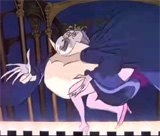
The Prosecutor Explaining Pink's Crime to the Judge
|
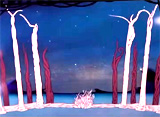
|
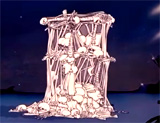
|
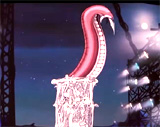
|
|
Worms Writhing on the Concert Stage - Symbols of
Decay That Formed the Judge's Stand (with the Judge First Represented
as a Slithering, Gigantic Serpentine Worm)
|
- in the concluding animated trial sequence cued to
the song "The Trial," on Pink's concert stage, writhing
worms that encircled each other rose up as vertical growths to form
the Judge's stand, with the Judge first represented as a serpentine
worm; a gray-haired prosecutor, who had been preening before a mirror,
appeared on stage to address the Judge, calling him: "Worm,
your honor"; on behalf of "the Crown," the Prosecutor explained how
the defendant had been caught "red-handed...showing feelings
of an almost human nature"; Pink had expressed an emotional
turnabout after a life of being 'walled in' and disconnected
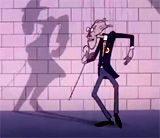
First Witness: Pink's Imperious Teacher Testifying
Against Young Pink
|
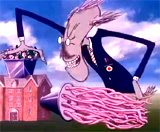
The Oppressive School System
|
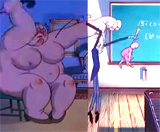
The Teacher Suffering Abuse at Home From His Wife
|
- in the kangaroo courtroom scene; the jury was
composed of Pink's memories of his painful childhood experiences;
the first to be called by the Prosecutor to testify against Pink
was his demanding and dictatorial school Teacher (a marionette
on strings), who felt he was unable to properly discipline, mold,
control and shape up young Pink: "I
always said he'd come to no good In the end your honor. If they'd
let me have my way I could Have flayed him into shape. But my hands
were tied, The bleeding hearts and artists Let him get away with
murder. Let me hammer him today?"; the schoolmaster turned into a
literal hammer
- after being accused, Pink
began to think that he was going insane and crazy: ("Crazy,
Toys in the attic I am crazy, Truly gone fishing. They must have
taken my marbles away")
- the second to testify against
the 'guilty' Pink was his betrayed and neglected wife, who was visualized
as a venomous female scorpion (with her hair on fire), chastizing
him for having gone his 'own way' and splitting himself off from
her; her judgments against him were more personal, and were actually
his own internal judgments on himself for having caused the dissolution
of their marriage: "You little s--t you're in it now, I hope they throw away the key. You
should have talked to me more often Than you did, but no! You had
to go Your own way"
- the third prosecution witness was Pink's Mother,
who cradled him as a "baby," but then smothered him in
her gigantic arms and judged him: "I never wanted him to Get
in any trouble. Why'd he ever have to leave me?"; after his
mother's testimony about her excessive maternal possessiveness, Pink
again questioned his 'sanity,' with euphemisms such as "over the
rainbow," and "bars in the window" - was he making an 'insanity plea'
before the court?; he also tacitly admitted that he hadn't realized
that the wall contained a 'door' through which he could have established
communications and connections with the outer world
- the Judge then appeared, revealed to be a giant
set of buttocks (topped with a wig), with a chin resembling male
testicles, and two large legs; the Judge talked out of his anus (substituting
as his mouth), equipped with teeth; without consulting a jury,
he announced that the evidence against Pink from his teacher, wife,
and mother was incontrovertible -- "In
all my years of judging I have never heard before Of someone more
deserving Of the full penalties of law";
the Judge then told how he felt the urge to defecate
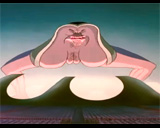
|
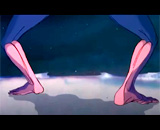
|
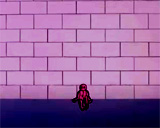
|

|
|
Judge Arse Pronouncing Judgment Upon Pink Inside
the Brick Wall
|
- the Judge revealed his ultimate judgment and sentence;
as he moved himself backwards toward the wall that was enclosing
Pink (a miniscule figure at the bottom) - the Judge yelled down
through the opening at the top of the cylindrical wall: "Since,
my friend, you have revealed your deepest fear, I sentence you
to be exposed before your peers. Tear down the wall!"; as
he did so, he was squatting on the top of the cylinder and literally
defecated toward Pink; Pink was flooded with momentary flashbacked
images (film clips) of his entire past and injured life (and each
of the bricks that had caused his crisis)
- later that night at the concert, the brick wall
trembled and cracked, and then exploded into many fragments;
Pink was liberated and reborn as he screamed, without any more
defense mechanisms, or any further acting out with violent prejudice
and oppression; the destroyed bricks dissolved into a white and dusty
fog; he had been both enlightened (or purified or purged) and extinguished
- before the rebirth
- the final song: "Outside the Wall" was
heard as very young children were cleaning up piles of debris
(glass milk bottles in crates) and bricks from an earlier riot;
one boy emptied the flammable liquid contents of a Molotov cocktail
before a freeze-frame and the scrolling of the end credits
|
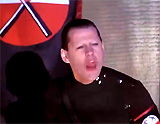
A Foreshadowing Sequence: "In the Flesh" - A Neo-Nazi Leader
Addressing an Arena Rally-Audience Of Young Skinheads


The Bloody Death of Pink's Father on the Battlefield at Anzio in WWII

Pink Floating in His Private Swimming Pool of His Hotel Room Suite - Envisioning
His Father's Death
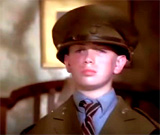
10 Year-Old Little Pink (David Bingham) - Discovering His Father's Military Uniform
and Wearing His Hat
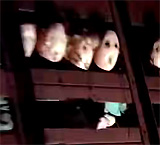
Train Passengers - Young Faceless Children With Grasping, Claw-Like Hands
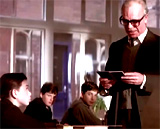
Little Pink Humiliated by His Teacher For Writing Poems in Class - One Poem Was
Read Outloud
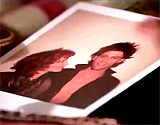
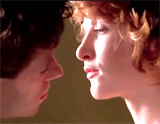
Pink's Choice of a Wife (Eleanor David)
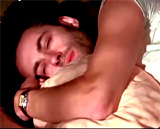
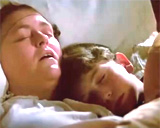
As an Adult, Pink Recalled His "Mother" and the Damaging Effects of
Her Over-Protectiveness
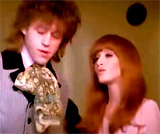
Pink's Wedding to His Wife
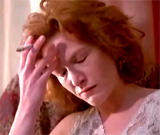
The Disintegration of Pink's Relationship With His Wife - Signified by Her Teardrop
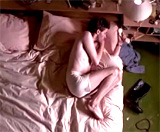
Pink in a Fetal Position - Stunted in Maturity and Personal Growth Due to His
"Mother" ("You'll always be baby to me")



Gerald Scarfe's Botanical Act of Intercourse and Devourment ("Dueling Rosebuds")

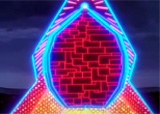
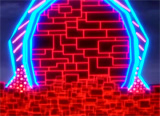
Animation of Pink's Tortured Pain, and The Rapidly-Growing High Brick Walls
During
"What Shall We Do Now"
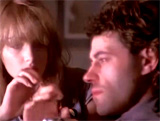
The Downbeat Song: "One of My Turns" - Pink Turned Cold To the Groupie
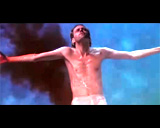
After Pink's Destructive Rampage - In Pool
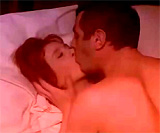
Pink Fantasizing Being With His Wife
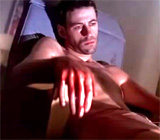
Aftermath of Pink's Bloody Fury - Sitting Alone
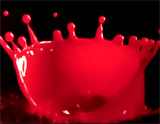
Enlarged Close-Up of Blood Dripping From His Hand Onto the Floor

The Figurative Brick Wall Constructed Around Pink to
Protect Him and Also Isolate Him From the World
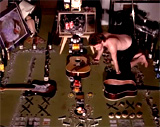
The Crazed Pink Placed Items in Patterns on His Living Room Floor
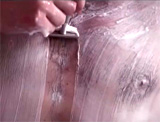
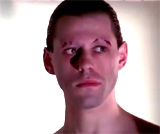
Pink Shaved His Entire Body
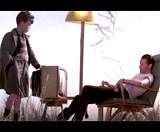
Young Pink and Adult Pink
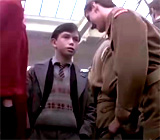
Young Pink Sadly Watching Returning Soldiers Greeted at Train Station
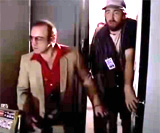
Pink's Manager (Bob Hoskins) and Others Breaking Into Pink's Hotel
Room to Revive Him
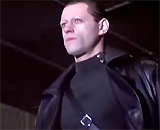
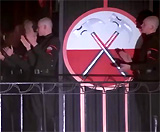
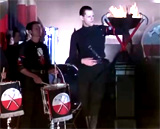
Pink Morphed Into a Fascist Dictator Speaking to a Neo-Nazi Indoor
Political Rally in London
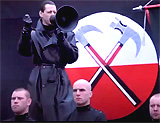
Pink Leading Outdoor Rally in Suburban London (Brixton)
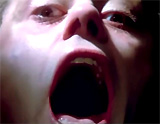
Pink: Screaming: "STOP!"
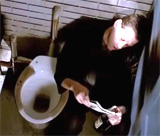
Pink Cowering Down in a Toilet Stall
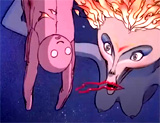
Pink's Wife Testifying Against Him in the Trial
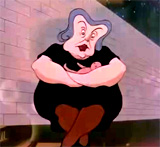
Pink's Smothering Mother
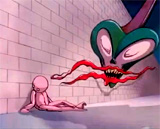
Pink Portrayed as a Helpless, 'Crazy' Ragdoll Enclosed
in a Cinderblock Prison
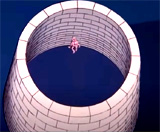
Pink Enclosed Inside the Brick Wall Cylinder
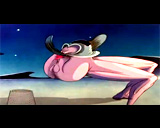
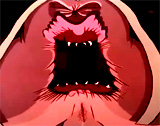
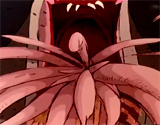
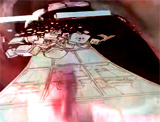
The Judge Backed Himself Up to the Cylinder and Defecated Onto Pink After
Yelling Through His Anus: "Tear Down the Wall!"

The Explosive Tearing Down of Pink's Wall
|
















































